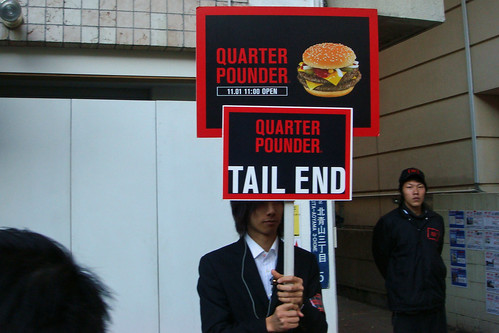Cultivating imported products into megahits is a big part of how consumer trends are created in Japan, and food is no exception to the rule. Last year, it was the American donut shop, Krispy Kreme. The year before that, it was the American ice cream shop, Cold Stone Creamery. Both are Western foods that are familiar to the Japanese, with a unique twist. Both gained fame for long lines in front of their stores. And both were carefully cultivated hits.
Another hit involving long lines made news last November. In a lauded marketing scheme to introduce the Quarter Pounder to the Japanese market, McDonald's reopened two shops in the fashion district of Omotesando and hippie hotspot of Shibuya as renovated “Quarter Pounder Shops” without using the McDonald's brand name. With a red and black color scheme, the stores only had two items on the menu: the Quarter Pounder and the Double Quarter Pounder. Neil Duckett reports on his trip to the Shibuya shop with photos.

Photo of the line at Shibuya shop by ames ef
Following a successful debut in Tokyo, McDonald's Japan announced [ja] that the Quarter Pounder debut in the Kansai region was also a major success – Midosuji-Suomachi shop in Osaka had received about 15,000 customers on the first day and broke sales records.
However, around 1,000 of those customers turned out to have been hired beforehand to make a purchase. Talk began to circulate around the blogosphere after Ubersite GIGAZINE posted a screenshot of a recent ad from the temp agency Fullcast in an article titled “Short-term job to ‘line up to buy and eat a new product’ announced – Hourly rate is 1000 JPY”. McDonald's says that it was market research to collect feedback, and that it wasn't an intentional attempt to create buzz.
Hiroshi Onishi questions that claim:
マクドナルドの人たちは、新聞とかテレビなどのニュースしかチェックしてなかった可能性があります。今どきは、ネットを検索し、ネットでの反応も含め、どういったことがネットに流れているのかとチェックするのは常識だと思うし、チェックしていれば、膨大なアクセス数を誇るGIGAZINEの記事を見逃すわけが無く、モニター調査だったという苦しい言い訳をしないで済んだと思いますね。
Happy-kernel wonders about other companies:
しかし、ファーストフードの雄・マクドナルドがこのような、「サクラ」を使って行列を作らせ、販売促進をしていたとなると、もしかして・・・他社はどうなのだろう?と、思ってしまうのは私だけではないと思う。と言うのも「行列が出来ると、その行列に意味もなく並んでしまう」という傾向は、誰にでもあるからだ。
Takeshi Kouno refers to the story of the Emperor's new clothes and points out:
ていうか団体の中にそういう企業がいる場合、ちゃんと参加企業同士でチェックできますかというのがひとつ目の問題。そして、仮に自社がステルスやPPP(PayPerPost)をやってないとしても、クライアント(この場合マクド)と取引がある場合、ちゃんと批判できますかというのが二つ目の問題。広告出稿してもらってるから、別件で仕事してるから、そういう理由で黙殺しませんか。実際トヨタやパナソニックが問題起こしても、テレビではほとんど報じられないよね。少なくともいまのテレビに代表される旧メディアの広告代理店と媒体企業は言えてないわけで、同じジレンマに陥るのがオチじゃないかと。
Minesuke Nakamura gives his opinion from a journalistic point of view:
勘違いすべきでないのは、今回、マスコミが「怒って」いるのは、マクドナルドがモニターを動員したこと自体ではなく、その事実を伏せたまま、「過去最高売上」「徹夜の大行列」をアナウンスしたことにあります。それを信じて記事を書いた記者には、誤った情報を読者に届けてしまった、という「損害」が発生しているのです。
「報道」としてメディアに露出される「パブリシティ」は、「広告」と異なり、おカネで買うものではありません。メディア(その背後の読者・視聴者)にとって価値のあるニュース素材を、それが「ウソ」「誇張」「間違い」ではないという信頼のもとに提供するから、企業にとっては、無料で宣伝できる、というメリットが発生します。マクドナルドが今回、メディアから失った「信頼」を回復するのは、容易なことではないと思います。







2 comments